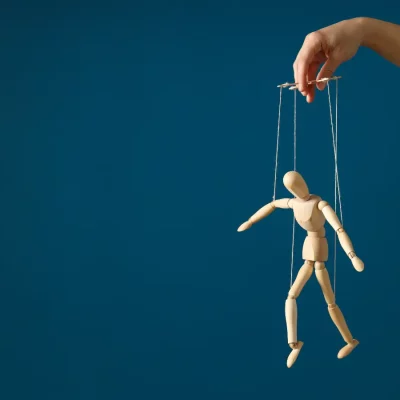Have you ever encountered someone who tried to control you? Do they tell you what to do or restrict your normal activities? Are you at a loss for what to do or say when they’re around?
If so, you’ve come to the right place. It’s likely that you’re dealing with someone who has control issues.
Controlling behaviors are common in individuals who are insecure or unsure of themselves. Unfortunately, these negative feelings towards themselves can be projected onto others. This may be why you’re feeling like the controlling individual is affecting you.
To learn more about controlling behaviors and what to do when you come into contact with people who have control issues, keep reading.
What are controlling behaviors?
While everyone wants to have a degree of control over their lives, unhealthy controlling behaviors will take this to another level. If you have control issues, you feel the need to control your life as well as the lives of others.
You’ve likely run into individuals like this. They will feel the need to tell you what to do or how to live. These compulsions can cross to the point of abuse if the controlling individual doesn’t let up.
Controlling behavior can occur in anyone towards anyone. They will potentially target friends, a neighbor, a boss, an employee, a partner, or anyone suiting their needs.
No matter how close (or not close) you are with the individual, they’re going to try to input themselves into your life. In order to protect yourself, you need to understand how to identify and stop this kind of behavior.
The receiving end of control issues
If you are on the receiving end of controlling behaviors, you may feel embarrassed, angry, or inferior. It’s important to know that you aren’t receiving these controlling behaviors because of anything you’ve done. The person who has control issues is likely trying to overcome their own anxieties by trying to control the world around them.
Signs of control issues
If you’re having trouble telling whether you’re dealing with a controlling person, there are a few signs that you can look out for.
-
Always in charge – First, people with control issues have to have things their way. Whether the matter is big or small, the controlling person has to be in charge of the outcome and others must follow what they say. They may coerce you into changing your mind or refuse to back down during a disagreement.
Controlling people show signs of narcissism and other self-centered behaviors.
-
Always innocent – Second, controlling people have trouble accepting any blame. They have no interest in admitting any fault, even when the situation is clearly their doing. Rather than accepting blame, they’ll deflect to others.
-
Center of attention – Third, people who have controlling behaviors think they’re the main character. In other words, they have to be the center of attention at all times.
-
Volatile – Fourth, controlling people are unpredictable. They switch between happy and sad, angry and joyful, and a myriad of other emotions. They want to keep everyone on their toes about what they’re going to do next.
-
Dishonesty – Fifth, people with control issues lie. The best way to get you to listen to them is by controlling your sense of reality. To do this, they’re going to tell you all the lies that you need to hear to believe that they have your best interest in mind. Gaslighting is a common technique.
In addition to these five behaviors, controlling people may show some other signs as well:
- They may ask to be in charge of all finances
- They may dictate what you can do, where you can go, etc
- They may show signs of jealousy
- They may act possessive towards you
- They may fear abandonment
With these behaviors and compulsions in mind, you should be able to identify people with controlling behaviors. With this information, you can better protect yourself and others.
Causes of controlling behaviors

Controlling behaviors can develop due to several different factors. However, the most common drivers of control issues are anxiety disorders and personality disorders.
Anxiety disorders
People who have anxiety disorders feel like they need to control things around them so that they can appease their anxiety. They feel like they can make their anxiety quieter if they make their environment less anxiety-provoking.
At the same time, these individuals refuse to give this control to others. They don’t think that anyone else can calm their anxieties as they can. So, they feel the need to handle things by themselves.
These anxious tendencies may start in early childhood. The controlling individual may have had an authority figure with controlling behaviors. Alternatively, they could have had a lack of supportive authority figures, leading them to have to take control of their care while growing up.
Personality disorders
As for personality disorders, control issues are common. Controlling behaviors are symptoms of several personality disorders, including histrionic personality disorder, borderline personality disorder, and narcissistic personality disorder.
The individual who is trying to control you may have an undiagnosed personality disorder. In order to get an official diagnosis, the individual would need to see a licensed practitioner.
Overall, controlling situations around them can help a person with control issues reduce their anxieties. It may also give them a sense of power when they would feel otherwise powerless.
Although this may sound good for the person with controlling behaviors, this is not an excuse to continue with these attitudes. If the person with control issues is negatively affecting those around them, their behaviors should be brought to a halt.
Overcoming controlling behavior
If you or someone you know struggles with controlling behaviors, there are plenty of things that you can do to try to overcome those urges.
Getting started is the hardest part. And, if you’re working with another person on their control issues, it may be hard to convince them to give these exercises a try.
As you look through these suggestions, try to pick a couple that you want to try for yourself or choose as a suggestion for someone else. In the case of controlling partners, it may help if both partners complete the exercise together so that one partner isn’t left completing the task by themselves.
1. Write in a journal regularly
Keeping a journal is one of the best ways to hold yourself accountable for your own thoughts and feelings. For those with controlling behaviors, journaling may help you realize how your anxieties are intruding on your life as well as others’ lives.
We recommend that you incorporate journaling into your normal routine, focusing on answering the following questions when you feel that you’re having intrusive thoughts:
- Are you under a lot of stress?
- Is stress (or something else) a trigger for your controlling behaviors?
- Who were you controlling and what were you asking them to do?
- What did you do wrong while you were experiencing these intrusive thoughts?
- What did you do right while you were experiencing these intrusive thoughts?
- What was the outcome of the situation?
- How could you better handle the situation next time?
By evaluating each controlling behavior, the individual with control issues may be able to learn from each incident. While the urge to control may never go away, it will help in acknowledging and lessening the need to listen to that urge. At the same time, you can deal with anxious thoughts.
2. Find the root of the controlling behaviors
One of the best ways to stop control issues is to understand why you have them.
Can you think of a particular moment during which you felt out of control? Did you have controlling authority figures while you were growing up? Did you have neglectful authority figures who let you do whatever you wanted?
Think about what kinds of thoughts and feelings may be leading you to act the way that you do in certain situations.
For example, you may feel the need to handle the finances because your last girlfriend spent all of your money. Alternatively, you may feel the need to drive the car because you got into a bad crash while someone else was driving.
If you can piece together these events and urges, you may be able to find out more about your controlling tendencies. Then, you can figure out how to work through the problems rather than letting them take you (and others) over.
3. Challenge your thoughts
Sometimes we just need to ask ourselves ‘Why?’ Why do I have to tell this person to do this? Why do I feel like I need to control this situation?
After asking why, you can start having a conversation with yourself. Rather than giving in to your controlling behaviors, you can take care of the ‘why.’
For example, let’s say that you want to tell your partner that they can’t go out with their friends tonight. Before saying anything, ask yourself ‘why.’
Upon doing so, you discover that you’re scared that something will happen. Maybe you had a friend get hurt one night when they went out with friends, and you’re afraid that that will happen to your partner now. Maybe you’ve been hurt in a past relationship and have trust issues. Whatever the circumstance may be, you must challenge your thoughts
With this information, you can find another way to ease your anxiety while allowing your partner to make their own decision. You could ask them to update you throughout the night, letting you know when they arrive and when they’re on the way home.
The keyword here is ‘ask.’ You should never force anyone to do anything.
However, you can ask your partner if they’d be willing to meet you in the middle by sending update texts. Most likely, they’re going to be more than willing to give updates throughout the night, especially if you explain your worries.
When in doubt, communicate your feelings and ask for a compromise that could suit both parties.
4. Learn to let go
This may be one of the hardest things for controlling individuals to grasp. Letting go isn’t easy, especially when you feel like you’re going to hurt yourself in the process.
Unfortunately, many things are out of our control. You can do things for yourself, but you can’t control others and you can’t control the world around you. Sometimes, you can’t even control the situation that you’re currently in.
However, you can learn to be okay with not having control over everything.
Letting go is ultimately better for your mental health and the mental health of those around you. Learning to let go will take some time, and you’re going to fight it when you’re first starting. But, it will be worth it in the long run.
5. Accept yourself (and others)
One of the root problems with controlling behaviors is the inability to accept oneself or others as they are. Because of anxieties and worries, the person with control issues believes that they and others must constantly follow unwritten rules of life. Without these rules, they believe life would be chaotic and anxiety-provoking.
People with control issues have to learn how to be okay with the uncertainties in life. And, the best way to do that is to be accepting of oneself and everyone else as they are right now.
There shouldn’t be any criteria that you have to live by to be worthy. Everyone is worthy of love and acceptance as they are in this moment.
By realizing this, people with control issues are able to get out of controlling behaviors that may be holding them back. And, they can stop themselves from imposing their will on those around them.
Rather, they can see others as managers of their own destinies.
Overall, self-acceptance and the acceptance of others are a great way to understand the concept of free will and curb anxieties when it comes to unpredictable situations.
Get help with control issues

Even with all of this advice, control issues aren’t going to go away overnight. As we discussed, controlling behaviors develop because of an inherent need to protect oneself and others from the worries that the individual has.
In order to get these controlling behaviors under control, you have to get the thoughts under control. If you’re ready to get started with your journey, contact our team at Makin Wellness. We’re here to help you heal from your controlling behaviors and their roots.










This Post Has 3 Comments
Omg I have been blaming my partner for Being the ONE WHO IS A CONTROL Freak!! Help ITS ME
Hey Deborah. Control can be a difficult thing to deal with. Feel free to schedule an appointment with one our team members, we’re here to help.
Wow this really resonated. My partner has been telling me for years that I need to let go of control, because it shows in things like criticizing him for the way he talks to our kids, the way he eats, the way he… does ANYTHING. Eek. Guilty.
I need to take action to save our marriage. Thank you so much for this article, I appreciate the thorough information, and suggestions for how to take action.